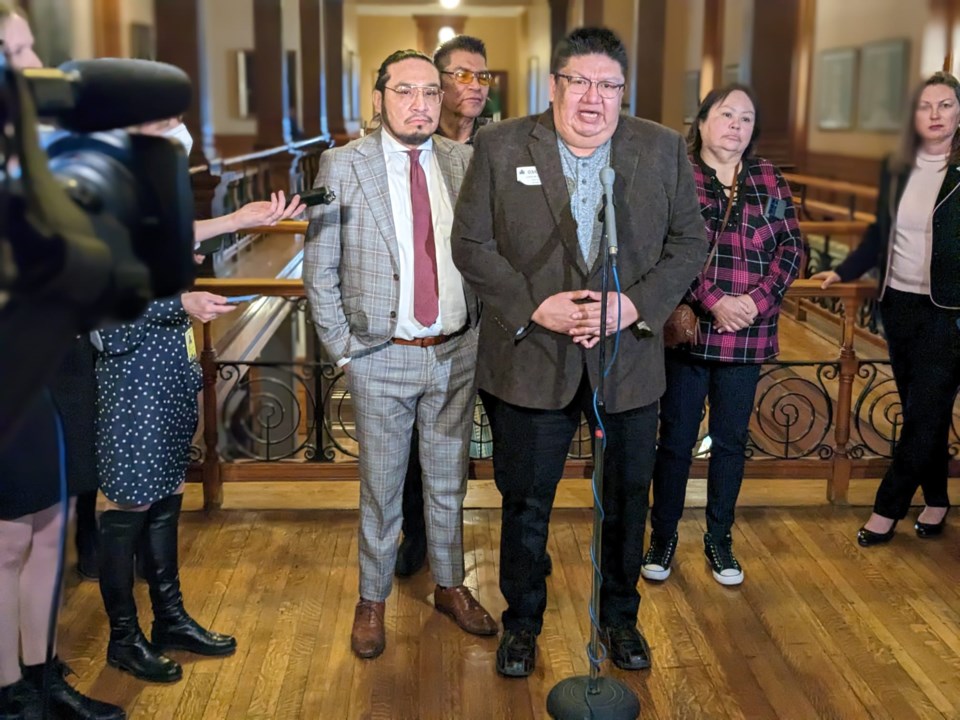EDITOR’S NOTE: This article originally appeared on The Trillium, a new Village Media website devoted exclusively to covering provincial politics at Queen’s Park
Incoming Neskantaga Chief Chris Moonias was at Queen's Park on Thursday demanding a meeting with Premier Doug Ford — and only Ford — over what he considers a lack of adequate consultations on the government's latest mining bill and the push to develop the Ring of Fire.
"I'm only going to talk to the individual that wants to drive that bulldozer and run over my homelands," said Moonias, who is set to take over as the first nation's chief on April 1. "I ain't talking to anybody else, except him."
Moonias' "bulldozer" comment references a remark Ford made in 2018 about the Ring of Fire before he became premier.
"If I have to hop on that bulldozer myself with (Nipissing MPP Vic Fedeli, now minister of economic development) on the other one, we're going to start building the roads to get to the mining," Ford said.
"When we get in there, we're going to start doing and stop talking and start creating economic prosperity up in the north. This is comparable to oil sands in Alberta," he added at the time.
Ford's office did not respond to The Trillium's questions on the matter by deadline.
The Progressive Conservatives' latest mining bill, the Building More Mines Act, just passed second reading and is heading to the Interior Committee. The bill will speed up mine approvals by rejigging how mine closure plans work and make other technical changes.
After the vote, Moonias and NDP MPP Sol Mamakwa spoke to reporters on the issue.
"I've listened to the proceedings in this colonial house and I feel like my rights have been, are being, trampled on," Moonias said. "There has been no consultation or accommodation to my First Nation."
Neskantaga is an Ojibwe Nation over 400 kilometres northeast of Thunder Bay. The Attawapiskat River is part of its traditional territory and the proposed road to the Ring of Fire crosses the river.
The river is essential to Neskantaga's way of life, Mamakwa said, and provides resources like sturgeon.
"It's part of their way of life for 1000s of years, and wanting to change that, change your ways of life, that's the issue," he said.
"This is not the Wild West in the North. We cannot have that because (the Neskantaga Nation) will fight to make sure that the river is not crossed without free, prior, and informed consent," Mamakwa added.
"We are being told to change our way of life forever. We're being told we're building a road without your free, prior, informed consent. We want to be a part of it," Moonias said.
"We want to make sure everything is protected. We want to make sure that our way of life is protected. We want to make sure that the cumulative impacts are also talked about. So those are the things that we must have that conversation," he added
At the Prospectors and Developers Association of Canada (PDAC) conference on Monday, Neskantaga's current chief, Wayne Moonias filmed a video saying companies looking to cross the river are "going to have to kill us" to cross it without the Nation's consent.
"You're going to have to do more than just get access from the province of Ontario," he said on Monday.
Dayna Nadine Scott, a York University lawyer serving as an adviser to the Neskantaga Nation, said the nation has been left out of most of the process.
"There have been attempts by the consultants for the projects to consult or engage with the Neskantaga First Nation, but there have been no meaningful attempts to actually adopt the consultation protocols that Neskantaga requires," she said in an interview with The Trillium on Monday.
"Ontario believes that it can delegate what it calls the procedural aspects of consultation to the proponents," she added. "Ontario refuses to come to the table and try to speak to Neskantaga about their concerns."
It contains several deposits of minerals like cobalt and chromite which underpin modern manufacturing of things like electric vehicles and cellphones. The Ontario government has already earmarked nearly $1 billion for developing the road to the remote area.
The "road" to the Ring of Fire is several different projects commonly lumped together.
There's one road — dubbed the Marten Falls Community Access Road — that would connect the Marten Falls Nation to the existing provincial highway network near Aroland First Nation.
The second portion — referred to as the Northern Road Link — would connect the Marten Falls road to the Ring of Fire Region, which is just east of the Webequie's traditional territory. This is the road that would cross over the Attawapiskat River.
Then, there's another road — the Webequie Supply Road — that would connect the Ring of Fire region to the Webequie's territory.
At PDAC on Monday, Mining Minister George Pirie announced two other nations — the Webequie and Marten Falls — agreed with the provincial government on how to proceed on an environmental assessment.
Last year, Webequie First Nation and Marten Falls First Nation published a 253-page document outlining the terms of reference for an assessment of two of the roads to the Ring of Fire. On Monday, Ontario approved the terms.
Monday's announcement doesn't mean the environmental assessment will now start but is a step toward that happening.
Webequie Chief Cornelius Wabasse and Marten Falls Chief Bruce Achneepineskum welcomed Monday's announcement.
"I look forward to good relationships, and I'm happy that each of our communities will prosper from future development in the Ring of Fire area," Wallace said during the press conference.
